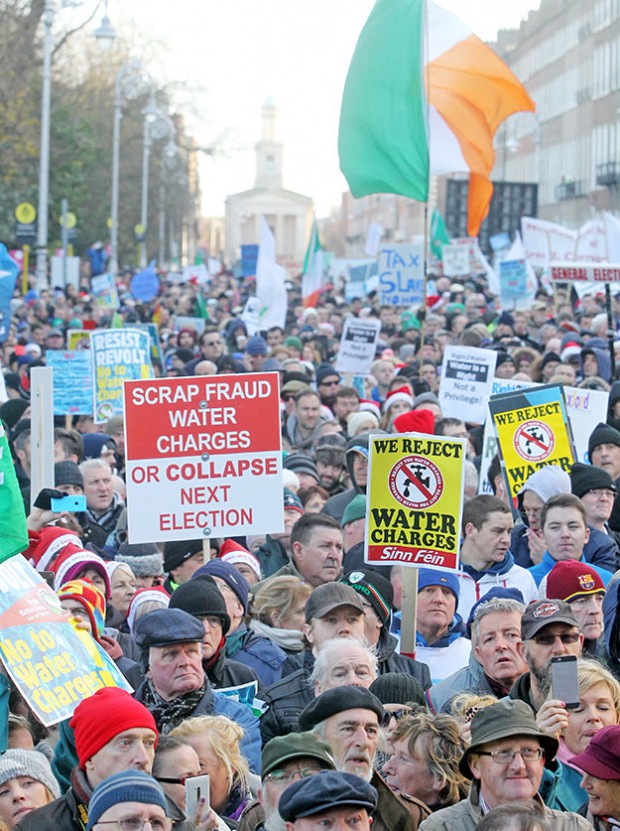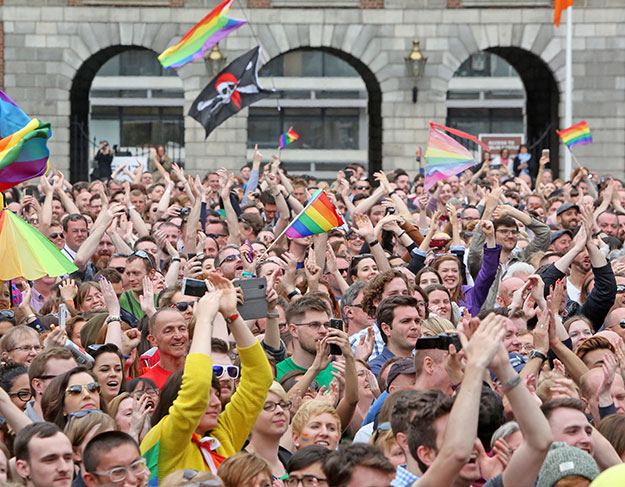1 July 2015 Edition
We need a new vision of the future
Building an Alternative

• Thousands take to streets in opposition to water charges
What is badly missing in Irish politics is an articulated vision of a transformed Ireland – politically, economically, socially and culturally – that is both inspiring and credible
PAINFULLY, fitfully, we are witnessing the early signs of a new politics being born across the periphery of Europe and in the wave of new Left governments in Latin America. SYRIZA in Greece, Podemos in Spain, the Scottish National Party breakthrough in Scotland and now the colourful victory of the marriage equality referendum in Ireland show the eruption of grassroots discontent and aspiration within the political system.
However, let us not delude ourselves that this holds the promise of a breakthrough by the Left any time soon.
In his insightful book, Challenging Neoliberalism, on the emergence of the new Left in Latin America, Eduardo Silva traces the process of how different sectors of civil society found common cause in the struggle against neoliberalism and that finally led to the new left conquering state power. It took at least two decades of struggle.
In Ireland, we are very far from that point. Civil society struggles remain fragmented and have yet to identify a common enemy in neoliberalism. Struggles against austerity too often play to the anti-state and anti-tax instincts deeply ingrained by decades of Fianna Fáil hegemony. The state, not capital, is too often seen as the enemy to be combatted.
Attempts by political parties to link with these grassroots movements have been too top-down and instrumental. By contrast, SYRIZA and Podemos emerged in their different ways as groups within political society that could give expression to the aspirations of civil society for a new type of politics with an inspiring transformative vision. Until recently, Podemos didn’t even have a political programme; instead, it grew on the basis of the vision and practice of a new type of relationship between citizens and the state.
What is badly missing in Irish politics is an articulated vision of a transformed Ireland – politically, economically, socially and culturally – that is both inspiring and credible. Far too often, slogans substitute for serious analysis and the hard intellectual work of fashioning an alternative. And, as Podemos is doing, the fashioning of that alternative must be a collective effort with real input from citizens’ assemblies. Bottom-up, not top-down.
The central task of any alternative is to challenge the immense power of capital, both national and foreign, over extensive swathes of the Irish economy, society and, indeed, the Irish state itself.
Returning real power to citizens to fashion the sort of society we want, in meeting our needs, will require a democratic revolution and creative leadership. Indeed (as Austrian economist Christian Felber outlines in his work on ‘the economy of the common good’), we need to redesign our economy through democratic deliberation, returning to a key dimension of early socialist thought.

• Support for marriage equality
All our political parties have for decades abdicated responsibility for development policy, handing it over instead to an alliance of the IDA and foreign multinationals. We lack any vision of a citizens’ economy, based on the flourishing of local entrepreneurial talent, organised in a dense sector of workers’ and consumer co-operatives.
The term ‘equality’ peppers our political discourse but what is missing is the detailed work of refashioning our taxation and welfare systems so that income and wealth are redistributed effectively, and poverty and equality reduced decisively. At least the Nevin Institute is making a start that hopefully will inform some courageous redistribution policies. And the Irish Left has yet to wake up to the fact that climate change is at long last presenting serious limits to the freedom of capital, as Marx predicted. The world’s scientists are united in telling us that the days are numbered for our growth economy and consumer society if we are not to make the planet uninhabitable for humans.
But the Left has yet to embrace these realities and the opportunities they open up for moving from a growth economy to an economy of maintenance, from a consumer society to a society of sufficiency, and from a fragmented and stressed individualism to a rich web of community interdependency in vibrant local societies.
We are on the cusp of a new era in human history and the end of industrial society. We in Ireland have many strengths to help us navigate these changes in ways that cherish all equally, especially the most vulnerable, and that severely limit the ability of capital to fashion society in its benefit. The slogans of the past have little to offer; we need a new vision of the future.
» Peadar Kirby is Professor Emeritus of International Politics and Public Policy, University of Limerick and is also Chair of the board of Cloughjordan ecovillage.




